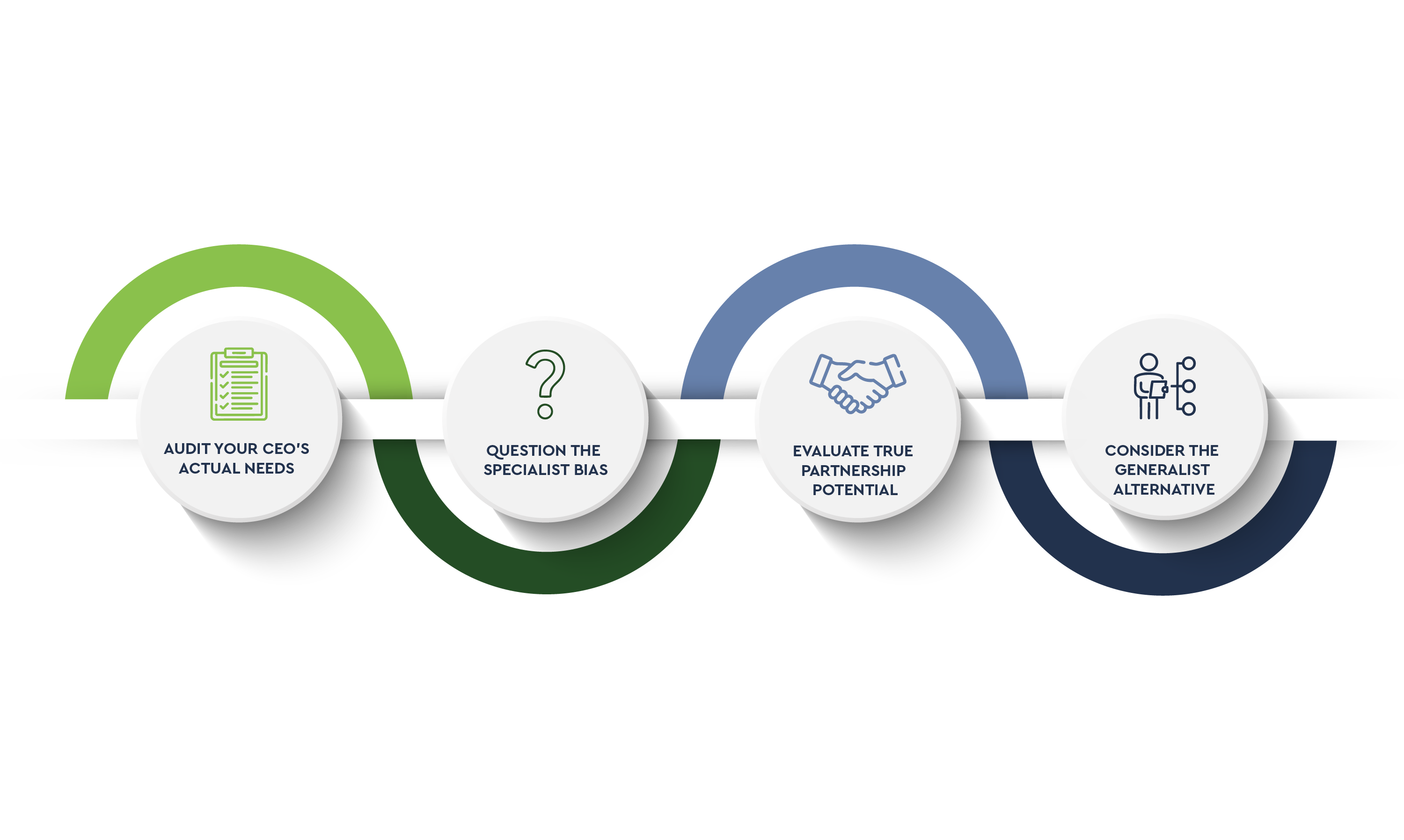
Are we creating specialist CHROs when CEOs need generalist partners? The Total Rewards Leader experiment
Are we creating specialist CHROs when CEOs need generalist partners? The Total Rewards Leader experiment
As more companies elevate Total Rewards Leaders into CHRO roles, a deeper risk emerges: CEOs lose the strategic partner they need most. Here’s why the trend is accelerating—and why organizations should rethink it now.

EXECUTIVE SUMMARY
A notable trend is emerging across Russell 2000 companies: boards are increasingly appointingTotal Rewards Leaders (TRLs) as first-time CHROs, placing deep functional expertise at the center of strategic HR leadership. While TRLs bring valuable technical skills and business acumen, this approach raises important questions about the balance between specialist competencies and the broad strategic partnership that CEOs need most.
The CHRO role has evolved far beyond HR administration—today’s top performers serve as intimate thought partners to CEOs across a vast range of business challenges, from organizational design to crisis management to strategic pivots. They must seamlessly shift between generalist strategic thinking and specialist deep-dives, often within the same conversation.
We recognize a growing emphasis on technical fluency in CHRO appointments. While important, we believe this focus can sometimes overshadow the strategic leadership capabilities that are essential for driving long-term organizational success.
INTRODUCTION
The role of the Chief Human Resources Officer has evolved dramatically over the past decade. No longer confined to traditional HR administration, today’s CHROs must be strategic business partners, data-driven decision makers, and architects of organizational transformation. Against this backdrop, a notable trend has emerged: companies are increasingly turning to Total Rewards Leaders to fill their top HR positions.
This shift reflects both the growing sophistication of total rewards as a discipline and the evolving expectations placed on HR leadership. As organizations face unprecedented challenges in talent acquisition, retention, and alignment, the expertise that TRLs bring to compensation strategy, equity management, and data-driven people decisions has become increasingly valuable.
THE CEO PARTNERSHIP IMPERATIVE: WHAT BOARDS ARE MISSING
The intimate partner reality
The most successful CHROs share one critical characteristic: they serve as intimate thought partners to their CEOs across the full spectrum of business challenges. This partnership extends far beyond HR expertise into strategic counsel on market dynamics, competitive positioning, crisis navigation, and organizational transformation.
CEOs don’t compartmentalize their challenges—they need advisors who can seamlessly move between discussing executive succession planning, cultural transformation, regulatory compliance, and strategic workforce planning, often within the same conversation. The CHRO chair at the CEO’s strategy table isn’t reserved for “HR topics”—it’s for business partnership.
The generalist-specialist paradox
The most effective CHROs master what we call the “generalist-specialist paradox”—they maintain broad business acumen and organizational perspective while possessing the ability to dive deep into specific areas when situations demand. They’re business generalists first, HR specialists second.
What TRL appointments actually signal
When boards appoint TRLs to CHRO roles, they’re often making a statement about what they believe the role requires: technical expertise, financial acumen, and data-driven decision making. While these capabilities are valuable, this approach reveals a fundamental misunderstanding of the CHRO’s primary function as CEO thought partner and enterprise-wide strategic advisor.
The dangerous assumption
Organizations are essentially betting that deep functional expertise can be more easily expanded to broad strategic partnership than broad strategic partnership can be developed in functional areas. This assumption is not only questionable—it may be backwards.
WHY BOARDS CHOOSE TRLS (AND WHY THAT’S PROBLEMATIC)
The seductive competencies
Total Rewards Leaders do bring genuinely valuable capabilities that appear to address immediate business needs:
Strategic thinking
TRLs design compensation systems that theoretically drive business results, giving boards the impression they understand strategy. However, there’s a significant difference between optimizing within a defined strategic framework and providing strategic counsel to shape that framework in the first place.
Impressive data fluency
In boardrooms obsessed with analytics and measurement, TRLs’ comfort with complex modeling and metrics appears highly valuable. But data fluency without broad organizational context can lead to optimization of the wrong variables.
Budget credibility
Managing large compensation budgets provides financial credibility, but total rewards budget management is fundamentally different from the enterprise-wide financial stewardship expected of CHROs.
Structured change experience
TRLs do manage change, but typically within the controlled environment of compensation rollouts. The messy, ambiguous, politically charged transformation work that CHROs must lead requires different capabilities entirely.
SPECIALIZED EXPERTISE WITH EXECUTIVE IMPACT
Board exposure and governance experience
Many TRLs have extensive experience presenting to compensation committees and boards of directors, providing them with valuable exposure to governance processes and executive-level communication requirements.
Executive compensation and equity mastery
As executive compensation becomes increasingly complex and scrutinized, TRLs’ deep expertise in this area provides immediate value to organizations and executive teams.
Technology integration and innovation
TRLs often lead the implementation of sophisticated HRIS systems, compensation management platforms, and increasingly, AI-driven talent analytics tools. This technology experience positions them well for broader HR digitization initiatives.
WHEN IT CAN WORK
Some TRLs have successfully stepped into CHRO roles, particularly those who’ve expanded their scope through cross-functional initiatives, broader HR experience, and strong partnerships across the business. These individuals often bring a more enterprise-wide perspective that aligns well with the strategic demands of theCHRO role.
CRITICAL CHALLENGES AND DEVELOPMENT AREAS
Functional depth vs. organizational breadth
While TRLs excel in their domain expertise, the transition to CHRO requires significant expansion beyond total rewards:
Missing the forest for the trees
Effective CHROs possess what might be called “organizational intuition”, the ability to sense cultural undercurrents, political dynamics, and systemic issues that don’t show up in data. This intuition typically develops through broad exposure to organizational challenges across multiple functions and situations.
The intimacy gap
CEOs need CHROs who can serve as confidential advisors on sensitive matters ranging from executive performance issues to board dynamics to personal leadership challenges. This level of intimate partnership requires relationship-building skills and judgment that may not develop within the structured environment of total rewards management.
THE GENERALIST DEFICIT
Surface-level business understanding
While TRLs understand how rewards connect to business outcomes, they may lack deep comprehension of how different business functions interact, how market dynamics impact organizational design, or how strategic pivots require different human capital approaches.
Limited crisis navigation experience
When organizations face existential challenges—regulatory investigations, major cultural failures, competitive disruptions—CEOs need CHROs who can think systemically about human capital responses. TRLs may lack the breadth of experience necessary for this type of crisis partnership.
Political naivety
Total rewards work, while complex, often operates within relatively clear frameworks and processes. The CHRO role requires sophisticated navigation of organizational politics, stakeholder management, and influence without authority—skills not typically developed in specialist roles.
THE HIGH-STAKES GAMBLE: CAN ORGANIZATIONS AFFORD THE LEARNING CURVE?
The development illusion
Many organizations convince themselves they can develop TRL-CHROs through coaching, training, and supportive structures. While individual development is certainly possible, this approach ignores several harsh realities:
The time factor
Developing broad organizational intuition and CEO partnership capabilities takes years, not months. Meanwhile, the organization operates with a CHRO who may be learning critical competencies on the job during potentially crucial business moments.
The opportunity cost
Every situation where the TRL-CHRO provides narrow specialist thinking instead of broad strategic counsel represents lost value. These missed opportunities compound over time and may be difficult to quantify but impossible to recover.
The credibility challenge
Other C-suite executives and board members may question the TRL-CHRO’s strategic contributions outside their area of expertise, potentially marginalizing their influence when broad organizational perspective is most needed.
The alternative approach: generalist-first development
Rather than hoping specialists can develop generalist capabilities, organizations might consider the reverse: identifying high-potential generalist HR leaders and ensuring they develop deep expertise in critical areas like total rewards. This approach preserves the CEO partnership capability while building the technical competencies that boards value.
A PROVOCATIVE ALTERNATIVE: STOP TRYING TO FIX HR
The uncomfortable truth
Perhaps the TRL-to-CHRO trend reflects a deeper problem: boards and CEOs don’t fully understand what makes CHROs effective. Dazzled by technical competencies and measurable outcomes, they’re optimizing for the wrong variables while missing the intangible but critical capabilities that drive real strategic value.
What great CHROs actually do
The most effective CHROs in today’s environment share several characteristics that rarely appear on TRL resumes:
Enterprise-wide pattern recognition
They quickly identify organizational patterns and dynamics across functions, often seeing connections that others miss. This capability typically develops through broad business exposure, not functional specialization.
Ambiguity navigation
They thrive in ambiguous, politically complex situations where there are no clear answers or established processes. Total rewards work, while sophisticated, typically operates within more structured environments.
Intuitive strategic sensing
They possess an almost intuitive understanding of how people decisions will ripple through organizations and impact business outcomes. This intuition develops through extensive experience with diverse organizational challenges.
CEO emotional intelligence
They understand not just what CEOs need to hear, but what CEOs need to process, explore, and work through. This level of intimate partnership requires emotional intelligence and relationship skills that may not develop in technical roles.
RECOMMENDATIONS:A REALITY CHECK FOR BOARDS AND CEOS
For organizations tempted by the TRL solution
1. Audit Your CEO’s Actual Needs: Before appointing a TRL-CHRO, honestly assess what your CEO actually needs from their HR partner. If the answer is primarily technical expertise, you may be undervaluing the strategic partnership dimension.
2. Question the Specialist Bias: Challenge the assumption that deep functional expertise is more valuable than broad strategic capability. Consider whether you’re optimizing for impressive presentations over effective partnership.
3. Evaluate True Partnership Potential: Look for evidence that TRL candidates can serve as intimate thought partners across diverse business challenges, not just excel in their area of expertise.
4. Consider the Generalist Alternative: Instead of hoping specialists can become generalists, identify strong generalist HR leaders and invest in developing their technical competencies in critical areas.

For TRLs aspiring to CHRO roles
The path forward requires brutal honesty about capability gaps and aggressive development in areas that can’t be learned through coaching alone:
1. Seek TrueGeneralist Experience: Actively pursue roles that require broad organizational problem-solving, political navigation, and strategic thinking beyond total rewards.
2. DevelopCEO-Level Relationship Skills: Focus intensively on building the emotional intelligence and relationship capabilities required for intimate strategic partnership.
3. BuildPattern Recognition: Seek exposure to diverse organizational challenges to develop the intuitive understanding of enterprise dynamics that effective CHROs possess.
4. Test YourStrategic Thinking: Put yourself in situations where you must provide strategic counsel outside your area of expertise and honestly assess your effectiveness.
CONCLUSION:THE DANGEROUS SEDUCTION OF SPECIALIST EXPERTISE
The trend toward appointing Total Rewards Leaders as CHROs represents a fundamental misunderstanding of what drives strategic HR effectiveness. While TRLs bring valuable technical capabilities, organizations are gambling that specialist expertise can substitute for the broad strategic partnership that CEOs actually need.
This gamble might payoff in stable, predictable environments where HR challenges are primarily technical. But in today’s volatile business landscape, where CEOs face complex, interconnected challenges requiring broad strategic thinking, the limitations of specialist-turned-generalist CHROs may prove costly.
The most successfulCHROs don’t just understand compensation—they understand business. They don’t just analyze data—they intuit organizational dynamics. They don’t just manageHR functions—they serve as intimate thought partners across the full spectrum of business challenges.
The uncomfortable question
Perhaps the real question isn’t whether TRLs can become effective CHROs, but whether organizations appointing them understand what effective CHROs actually do. If boards are impressed by technical presentations and measurable outcomes while missing the intangible strategic partnership capabilities, they may be optimizing for the wrong variables entirely.
The path forward
Organizations serious about strategic HR leadership should resist the seductive appeal of specialist expertise and focus on what actually drives value: the ability to serve as intimate thought partners, navigate ambiguous challenges, and provide broad strategic counsel across diverse business situations. These capabilities can’t be developed through coaching or training—they emerge from extensive experience with the messy, complex realities of organizational leadership.
Boards: Consider revisiting your CHRO profile through the lens of your most pressing business challenges. What kind of leadership will best position the organization for success?
TRLs: Now is the time to broaden your impact: engage across the enterprise, build strategic partnerships, and deepen your understanding of the business to be ready when opportunity knocks.
The question isn’t whether we need more CHROs who understand compensation. The question is whether we need CHROs who understand business leadership deeply enough to be true strategic partners to their CEOs. That’s a fundamentally different requirement—and one that may be scarcer than we realize.
Meet the Author



